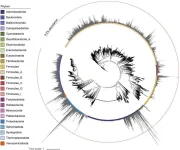JMIR Bioinformatics and Biotechnology invites submissions for research papers on machine learning-driven genomic predictive models
2024-01-24
(Press-News.org) JMIR Publications is pleased to announce a new theme issue titled “Machine Learning-Based Predictive Models Using Genomic Data” in JMIR Bioinformatics and Biotechnology. The peer-reviewed journal is indexed in SCOPUS and focused on research in bioinformatics, computational biology, and biotechnology. This new theme issue aims to explore cutting-edge research at the intersection of machine learning and genomics, fostering advancements in predictive modeling for biological insights.
JMIR Bioinformatics and Biotechnology welcomes contributions from global researchers, educators, and practitioners. We encourage submissions exploring diverse aspects of bioinformatics and biotechnology, with a focus on, but not limited to, the following topics:
Development and application of machine learning algorithms for phenotype prediction using genomic data
Exploring the integration of multi-omics data for predictive modeling
Predicting biological outcomes, disease associations, and functional genomics
Describing novel methodologies for handling large-scale genomic data sets
Contributors are encouraged to submit their work by May 15, 2024. All submissions will undergo rigorous peer review, and accepted articles will be published as part of the theme issue titled “Machine Learning-Based Predictive Models Using Genomic Data” in the journal JMIR Bioinformatics and Biotechnology.
To learn more please view the full call for papers here.
###
About JMIR Publications:
JMIR Publications is a renowned publisher with a long-standing commitment to advancing digital health research and progressing open science. Our portfolio includes a wide array of prestigious open access, peer-reviewed journals dedicated to the dissemination of high-quality research in the field of digital health. JMIR Publications is celebrating its 25th anniversary in 2024 as the leading open access, digital health publisher.
To learn more about JMIR Publications, please visit https://www.JMIRPublications.com or connect with us via X, LinkedIn, YouTube, Facebook, and Instagram.
Head office: 130 Queens Quay East, Unit 1100, Toronto, ON, M5A 0P6 Canada
Media contact: communications@JMIR.org
END
ELSE PRESS RELEASES FROM THIS DATE:
2024-01-24
Humpback whale singing dominates the marine soundscape during winter months off Maui. However, despite decades of research, many questions regarding humpback whale behavior and song remain unanswered. New research revealed a daily pattern wherein whales move their singing away from shore throughout the day and return to the nearshore in the evening. The findings were led by the University of Hawaiʻi, in partnership with NOAA’s Hawaiian Islands Humpback Whale National Marine Sanctuary, and published in Royal Society Open Science.
“Singers may be attempting to reduce the chances of their song being drowned ...
2024-01-24
New oviraptor dinosaur from the US Hell Creek Formation lived at the end of the Age of Dinosaurs and weighed about the same as an average woman
###
Article URL: https://journals.plos.org/plosone/article?id=10.1371/journal.pone.0294901
Article Title: A new oviraptorosaur (Dinosauria: Theropoda) from the end-Maastrichtian Hell Creek Formation of North America
Author Countries: USA, Canada
Funding: Funding for histology processing provided to HNW by Oklahoma State University for Health Sciences. Funding to GFF provided by the Royal Society (Grant NIF\R1\191527) and a Banting Fellowship ...
2024-01-24
Modelling shows how microplastics may bioaccumulate in the Galápagos Islands food web, with Galápagos penguins most affected, according to a study published January 24, 2024 in the open-access journal PLOS ONE by Karly McMullen from the University of British Columbia, Canada, under the supervision of Dr. Juan José Alava and Dr. Evgeny A. Pakhomov of the Institute for the Ocean and Fisheries, University of British Columbia, Canada, and colleagues.
We know that microplastics are building up in our oceans, but the extent of the damage to marine organisms is still being assessed. Here, McMullen and colleagues focused ...
2024-01-24
Obesity among primary school children in the UK spiked during the COVID-19 lockdown, with a 45% increase between 2019/20 and 2020/21 among 4-5-year-olds, according to a study published on January 24, 2024 in the open-access journal PLOS ONE by Iván Ochoa-Moreno from the University of Southampton, UK, and colleagues. The authors estimated that without reversals, increased obesity rates in Year 6 children alone will cost society an additional £800 million in healthcare.
During the first year of the pandemic, school closures dramatically altered the routines of young children. Cancellation of organized sports, ...
2024-01-24
A new study suggests that heatwaves are exacerbating socioeconomic inequalities in Brazil, with people who are female, elderly, Black, Brown, or who have lower educational levels potentially facing greater risk of death during heatwaves. Djacinto Monteiro dos Santos of Universidade Federal do Rio de Janeiro, Brazil, and colleagues present these findings in the open-access journal PLOS ONE on January 24, 2024.
As climate change progresses, heatwaves are becoming hotter, longer, and more frequent in many regions ...
2024-01-24
DNA from ancient feces can offer archaeologists new clues about the life and health of Japanese people who lived thousands of years ago, according to a study published January 24, 2024 in the open-access journal PLOS ONE by Luca Nishimura and Ituro Inoue from the National Institute of Genetics, Japan, Hiroki Oota from The University of Tokyo, Mayumi Ajimoto from Wakasa History Museum, and colleagues.
Fossilized feces, also known as coprolites, can preserve an array of genetic material from the digestive tracts ...
2024-01-24
At least 8% of the human genome is genetic material from viruses. It was considered ‘junk DNA’ until recently, but its role in human development is now known to be essential
Researchers at the Spanish National Cancer Research Centre (CNIO) describe for the first time the role of these viruses in a key process in development, when cells become pluripotent few hours after fertilization
The finding, published in Science Advances, is relevant for regenerative medicine and for the creation of artificial ...
2024-01-24
LOS ANGELES — Researchers at City of Hope, one of the largest cancer research and treatment organizations in the United States, and Translational Genomics Research Institute (TGen), a precision medicine research organization that is part of City of Hope, have developed and tested an innovative machine-learning approach that could one day enable the earlier detection of cancer in patients by using smaller blood draws. The study was published today in the journal Science Translational Medicine.
“A huge body of evidence shows that cancer caught at later stages kills people. This new technology gets us closer to a world ...
2024-01-24
Francis Crick Institute press release
Under strict embargo: 19:00hrs GMT 24 January 2024
Peer reviewed
Experimental study
Animals
Gene behind heart defects in Down syndrome identified
Researchers at the Francis Crick Institute and UCL have identified a gene that causes heart defects in Down syndrome, a condition that results from an additional copy of chromosome 21.
Reducing the overactivity of this gene partially reversed these defects in mice, setting the scene for potential future therapies for heart conditions in people with Down syndrome.
Down syndrome ...
2024-01-24
Genova (Italy), 24 January 2024 - Over the past four years, the research team at the Artificial and Mechanical Intelligence (AMI) lab at the Istituto Italiano di Tecnologia (IIT-Italian Institute of Technology) in Genova (Italy) has developed advanced avatar technologies, known as the iCub3 system, in continuous testing with real-world scenarios. The system was utilized to enable a human operator to remotely visit locations 300 km away, to entertain the public at events and television appearances, and ...
LAST 30 PRESS RELEASES:
[Press-News.org] JMIR Bioinformatics and Biotechnology invites submissions for research papers on machine learning-driven genomic predictive models








